AI email marketing tools allow crafting personalized email marketing messages with minimum manual effort. We identified below solutions based on their capabilities in content generation, marketing automation and optimization. Follow the links below to see our rationale for selection:
| AI Email Marketing Tools | Focus | |
|---|---|---|
1. | Advanced content optimization | |
2. | Businesses with comprehensive CRM needs | |
3. | Real-time lead generation and account-based marketing | |
4. | Personalized newsletters based on user behavior | |
5. | Email delivery optimization | |
6. | Multichannel marketing with SMS and push notifications | |
Top 10 AI email marketing tools
| Vendor | Average rating | Free plan | Free trial | Starting price/month |
|---|---|---|---|---|
| Mailchimp | 4.3 from 16,900 reviews | 1,000 email limit per month | 30-day | $13 |
| HubSpot Marketing Hub | 4.4 from 10,076 reviews | 2,000 email limit per month | 14-day | $15 |
| Jasper AI | 4.7 from 863 reviews | ❌ | 7-day | $39 |
| Drift Email | 4.3 from 863 1,235 reviews | ❌ | ❌ | $2,500 |
| Mailmodo | 4.6 from 163 reviews | ❌ | 21-day | $39 |
| Rasa | 4.9 from 90 reviews | ❌ | ❌ | $190 |
| Seventh sense for HubSpot | 4.9 from 21 reviews | ❌ | ❌ | $80 |
| Smartwriter | 4.0 from 10 reviews | ❌ | 7-day | $49 |
| Phrasee | 4.7 from 6 reviews | N/A | N/A | N/A |
| Optimail | 5.0 from 1 reviews | N/A | N/A | N/A |
Sorting is based on the number of reviews gathered from B2B review platforms G2 and Capterra.
Pricing information and features supported by vendors are obtained from vendor websites. Check out email marketing pricing for more detailed information.
Vendor selection criteria
- Focus area: Included vendors that provide at least one AI-powered email marketing feature (e.g. content generation, automated personalization or send time optimization)
- Market presence: Excluded vendors that do not have any reviews in B2B review platforms G2 and Capterra.
Features of top AI email marketing tools
| Vendor | Send time optimization | Content generation |
|---|---|---|
| Mailchimp | ✅ | ✅ |
| HubSpot Marketing Hub | ❌ | ✅ |
| Jasper AI | ❌ | ✅ |
| Drift Email | ❌ | ❌ |
| Mailmodo | ❌ | ✅ |
| Rasa | ❌ | ❌ |
| Seventh sense for HubSpot | ✅ | ❌ |
| Phrasee | ❌ | ✅ |
| Smartwriter | ❌ | ✅ |
| Optimail | ❌ | ✅ |
❌: AIMultiple team did not come across vendor statements about this feature.
Detailed evaluation of leading AI email marketing software
Mailchimp
Mailchimp email marketing tool provides more than 20 artificial intelligence and data science features.
Content generation: The Email Content Generator leverages GPT AI technology to suggest and generate subject lines, headers, preview texts, and sub headers for marketers to craft customized email marketing campaigns.
Creative assistant: It is designed to streamline the process of creating customized, brand-aligned designs for various marketing channels. By gathering the brand’s assets such as colors, fonts, logos, and images, creative assistant automatically generates on-brand graphics and layouts.
Content optimizer: Content optimizer performs an in-depth analysis of the email content by examining elements such as subject lines, headlines, body text, and call-to-action buttons to evaluate their readability, tone, and overall engagement potential. Based on this analysis, it provides real-time optimization suggestions to refine email messages for better performance.
Send time optimization: This feature analyzes when the email contacts are most likely to engage and schedules emails to be sent during these optimal times.
Real-life example:
Ink & Dagger Tattoo Shop and Tattoo Smart faced the challenge of managing marketing for two distinct audiences: local clients for the tattoo shop and a global market of tattoo artists for the e-commerce store. The owner of these companies needed a way to effectively reach both groups while maintaining brand growth and engagement.
Real-life result:
Mailchimp provided a solution with tools like automation, personalization, and analytics to manage the owner’s marketing efforts across both brands. For Tattoo Smart, Mailchimp created a six-email automated welcome series tailored to new customers, first purchases, and abandoned carts to show how their products improve productivity and design options for tattoo artists.
Mailchimp’s Timewarp feature allowed emails to be sent at optimal times in recipients’ time zones to maximize engagement. With Mailchimp, the owner successfully managed dual marketing strategies, while supporting the growth of both Ink & Dagger and Tattoo Smart.1
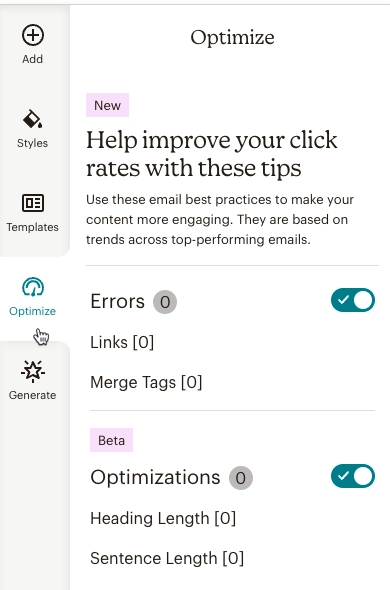
Figure 1: Mailchimp content optimization feature.2
HubSpot Marketing Hub
HubSpot Marketing Hub integrates with HubSpot AI to generate content for marketing emails, personalize and analyze data for performance reporting of email marketing campaigns. HubSpot AI also allows for automating tasks and workflows to increase marketing efficiency.
With HubSpot AI integration, businesses can utilize AI content and email writer, social caption, and meta description generator.
ChatSpot: ChatSpot is an artificial intelligence powered tool integrated into HubSpot CRM, designed to enhance productivity and efficiency in sales, marketing, and customer service.
It enables users to interact with the HubSpot system through natural language queries, and allows for tasks such as generating content, creating reports, scheduling tasks, and managing customer interactions more intuitively and efficiently.
With capabilities similar to ChatGPT, ChatSpot assists professionals in streamlining their workflows and improving business processes.
Real-life example:
The Linux Foundation is a nonprofit organization dedicated to fostering the growth of the open-source ecosystem. The company has improved its email marketing outcomes using HubSpot’s CRM and marketing platform.
They focused on enhancing their digital strategies by implementing better segmentation of their email list, which includes over two million contacts.This approach resulted in improvement in their email health scores and also aligned their sales and marketing efforts more effectively.
With HubSpot, The Linux Foundation was able to automate and personalize its CRM to suit its unique business model, which involves managing hundreds of open-source projects.3
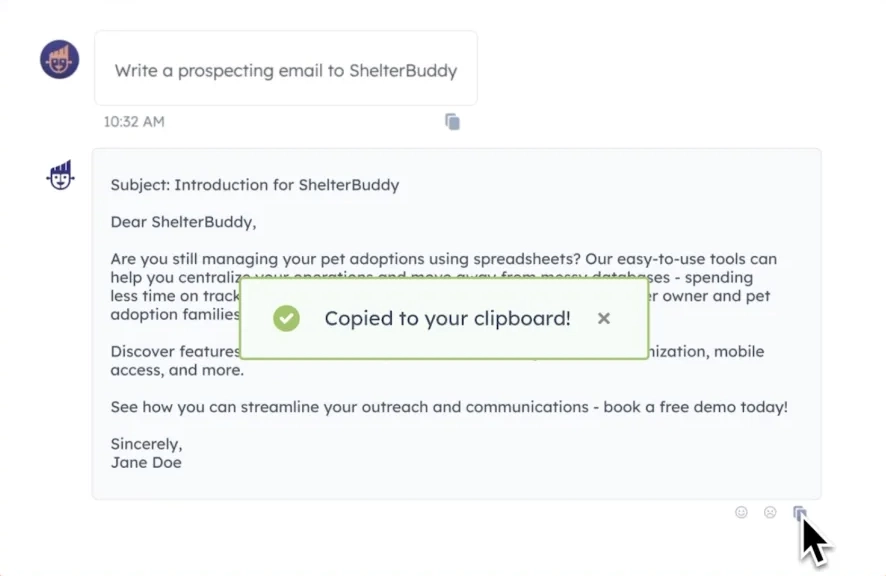
Figure 2: HubSpot ChatSpot feature example.4
Drift Email
Drift Email leverages artificial intelligence to enhance various aspects of email marketing and customer communication.
Lead generation: Drift Email enables engaging with site visitors in real time using AI-driven chatbots that can start conversations, answer questions, and drive lead conversion. This real-time interaction allows businesses to engage visitors with tailored messages and responses that adapt based on visitor behavior.
Account-based marketing (ACM): Account-based marketing (ABM) is a strategic approach that tailors marketing efforts to specific accounts, using personalized campaigns designed to engage each account effectively.
Drift facilitates ABM by identifying website visitors, analyzing their origin and the pages they visit, ensuring that marketing efforts target the appropriate accounts. The platform customizes messages, alerts sales reps when high-value accounts are online, and directs these accounts to the appropriate representative through custom routing.
Drift enables integration of data from various sources including marketing automation, CRM, and ABM tools, along with third-party data services like Clearbit, 6sense, ZoomInfo, and Crunchbase.
Real-life example:
Blue Yonder, founded in 1985, operates in digital supply chain transformation industry. The company continually invests in advanced technology platforms to support its growth strategy.
Blue Yonder implemented a pilot program with Business Development Representatives (BDRs) using Drift’s live chat to prioritize rapid meeting bookings, focusing on “time-to-meeting” rather than “time-to-lead.”
Real-life result:
With this integration, Drift enables targeted playbooks tailored to specific segments, while allowing BDRs to engage website visitors in personalized conversations.
Acting as the “voice and face” of Blue Yonder’s website, Drift also enhances the visitor experience with an avatar, Lumi, to make interactions more approachable and engaging. Drift’s chatbot capabilities have also improved engagement and conversion on the site, as users are three times more likely to share information through chatbots than traditional forms.5
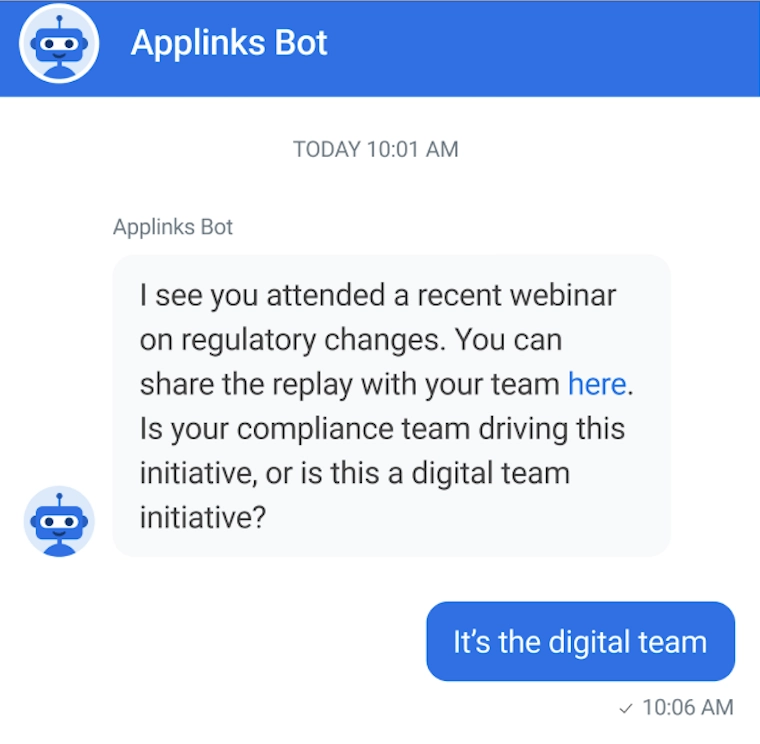
Figure 3: Drift Email’s ChatBot example.6
Rasa
Rasa.io is an email automation, content featuring and insights tool for your email marketing campaigns and is specialized in sending personalized newsletters based on the information gathered with user behavior analysis.
Content featuring: This feature enables sending out and optimizing personalized content which highlights the specific material in line with your customers’ interests. Featuring content is ideal for making critical announcements, and sending out invites for webinars and events. It’s also suitable for communicating time-sensitive information.
Real-life example:
The American Marketing Association (AMA), a professional group for marketing professionals, faced challenges in engaging its large membership effectively. To address this challenge, AMA partnered with rasa.io and utilized their AI technology for creating personalized emails tailored to each reader.
The use of rasa.io’s AI powered tools for personalization significantly increased AMA’s website traffic and attracted new visitors since the initiation of this feature.
This partnership also provided insights to help AMA’s editorial team on blending expert knowledge with varied behavioral data, as well as adopting a data-driven strategy to tailor and schedule content that aligns with member interests and trends.
Real-life result:
With a 47% increase in weekly open rates and click rates of nearly 10%, rasa.io effectively supported AMA’s marketing efforts. Moreover, the automated personalization of newsletters has been reported to save AMA over 50 hours.7
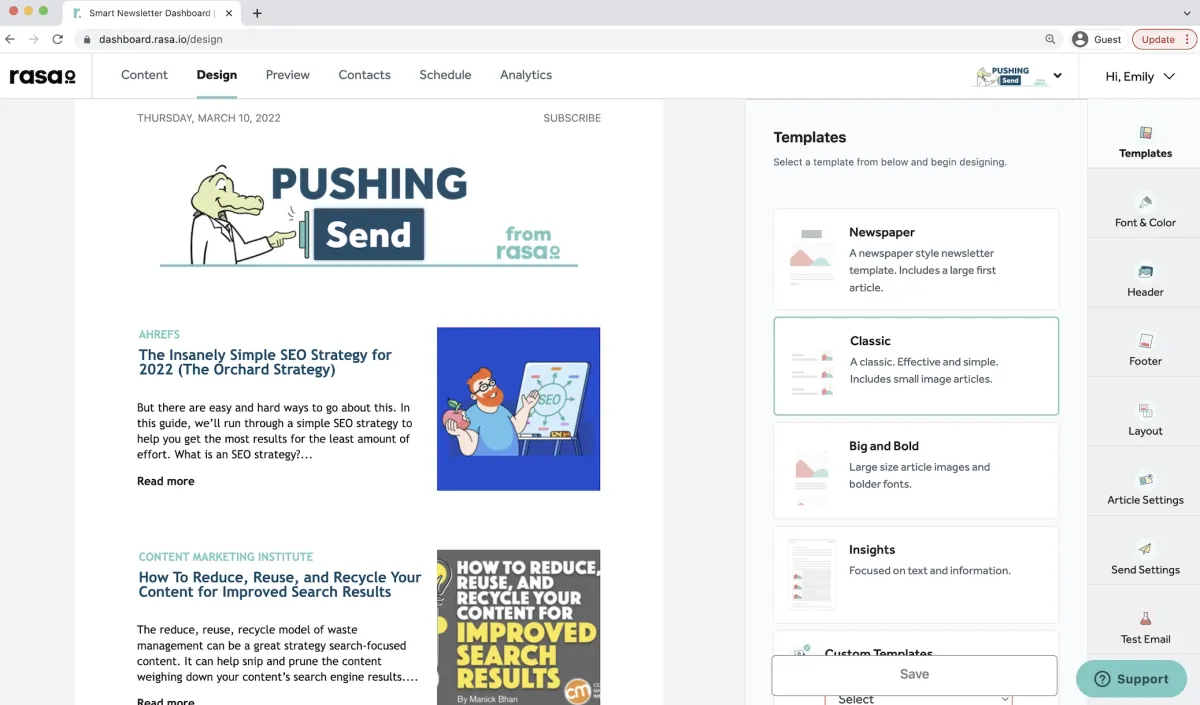
Figure 4: Rasa.io newsletter creation example.8
Seventh Sense
Seventh Sense enables an email delivery optimization system for HubSpot and Marketo to support email deliverability, user engagement and boost conversions.
With Seventh Sense’s AI-powered optimization tools, businesses can predict and optimize their email frequency and personalize email send times based on the analysis of optimal engagement times.
Seventh Sense uses automatic engagement based segmentation to effectively segment users in line with their preferences.
The software also allows for email throttling which refers to the practice of deliberately regulating the number of emails sent from one server to another within a specific time frame to avoid delayed or rejected emails.
Real-life example:
Brenthaven, a Seattle-based company known for its mobile technology cases, relies heavily on email marketing. Kelly Nealson, the Marketing Programs Manager, noticed a decline in email engagement and to mitigate this issue, implemented Seventh Sense with HubSpot for analyzing email engagement data.
Seventh Sense’s machine learning technology to create engagement profiles for each contact and predict the optimal times for email engagement allows marketers to set a delivery window. The analysis done by Seventh Sense revealed that Brenthaven had many disengaged contacts and a deliverability issue, with emails being marked as spam.
By optimizing send times and gradually distributing emails, Seventh Sense helped improve Brenthaven’s email domain reputation with Google, moving from “Bad” to “Medium” within a few months.
Real-life result:
This approach also led to an increase in email engagement, with a 211% rise in total clicks and a 122% increase in total opens year over year.9
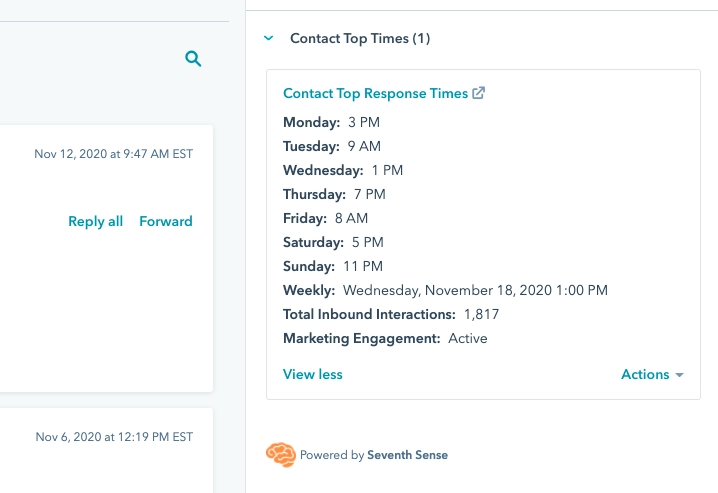
Figure 5: Seventh Sense send time optimization example.10
Smartwriter
Smartwriter is designed to automate and personalize email outreach for B2B sales processes.
Smartwriter creates personalized cold emails by analyzing online data and contextual information about prospects, such as job descriptions, social activities, and professional achievements.
Smartwriter offers advanced personalization features such as:
- Social personalization: personalization based on social activity, professional recommendations, achievements, and job descriptions.
- Personalized ice breakers: personalization based on recent articles, case studies and blog posts.
- Backlink personalization,
- Contextual pitches using social profiles or company information.
Smartwriter also provides a free email quality checker for better crafted emails that would have a higher change to be opened.
Automated SEO Backlink Outreach: By leveraging AI to read and understand the content of blogs, Smartwriter generates personalized backlink request emails that are context-specific to each blog. The aim is to speed up the process of link building from high domain authority sites, supporting SEO growth and organic traffic increases.
Real-life example:
EcomHype is an eCommerce growth agency that assists businesses in expanding their brands through digital marketing to establish an omnichannel presence and boost their revenue. The company uses SmartWriter platform to create personalized messages for prospects by utilizing data from the prospect’s website domain.
This approach enabled them to tailor their communications effectively, better understanding the needs and characteristics of their prospects.
Real-life result:
As a result of this personalized messaging strategy, EcomHype has seen a more than 40% increase in response rates that led to a higher number of booked appointments and more opportunities for closing deals.11
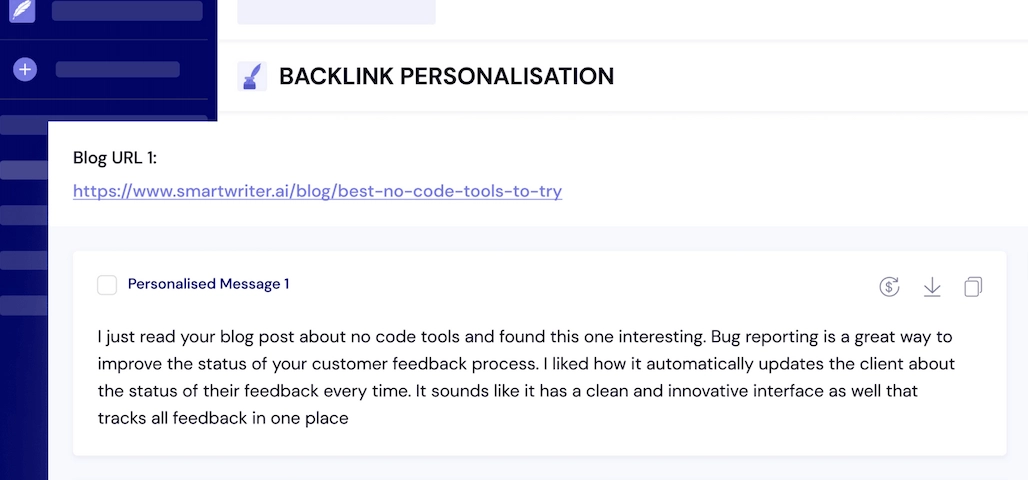
Figure 6: Smartwriter backlink personalization.12
Phrasee
Phrasee is an email marketing campaign, SMS, and push notification content generation and optimization tool. It also allows website and mobile application optimization with generative artificial intelligence powered features.
Content generation: Phrasee focuses on leveraging generative AI for marketing campaigns. With Phrasee’s “magic button”, businesses can generate personalized emails in line with the specific brand voice such as pre-headers, subject lines, headlines and call-to-action (CTAs).
Testing and experimentation: Phrasee also enables conducting A/B/N experiments to compare messages generated with Phrasee with other content to understand which message performs better.
Push notifications and SMS messages can also be personalized to increase trust between the business and the customers.
Real-life example:
CAA Club Group (CCG) is a membership organization that offers a range of services and products related to automotive, travel, insurance, and roadside assistance. CCG collaborated with Phrasee to enhance their email marketing strategies for four main customer segments: Merchandise, Newsletter, Travel, and Rewards.
Using Phrasee’s automated content experimentation technology which is integrated with Salesforce Marketing Cloud, CCG could test various styles, tones, words, and phrases in their emails.
This allowed them to fine-tune their messaging to better resonate with their target audiences across different segments.
Real-life result:
This AI-powered experimentation resulted in an improvement in their email campaigns, with an 26% increase in average click rates and 7% increase in open rates.13
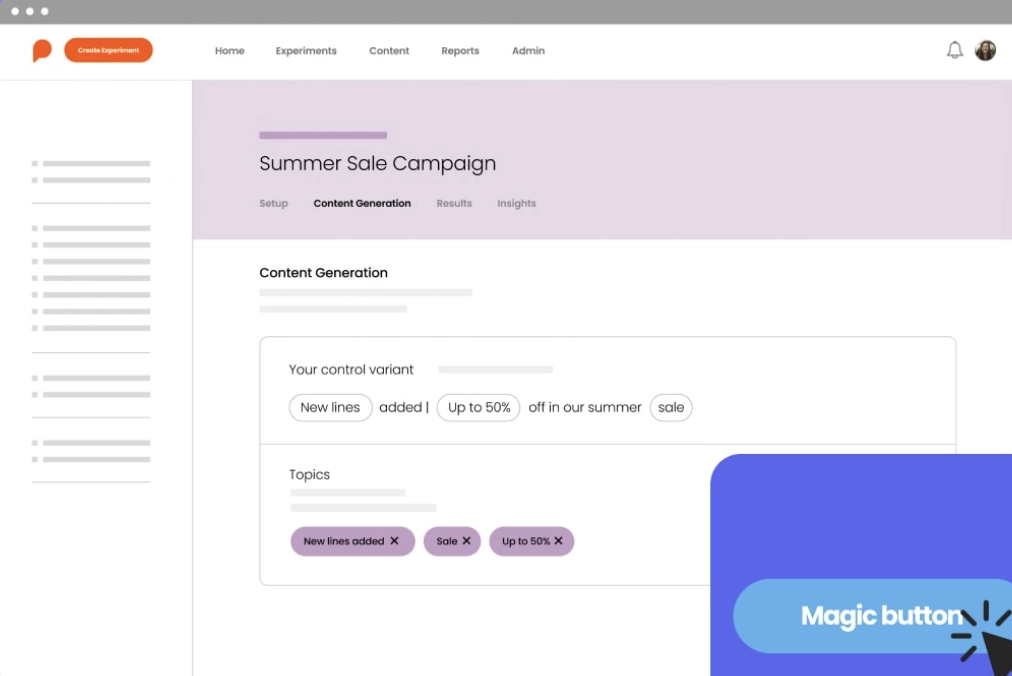
Figure 7: Phrasee magic button for content generation feature.14
How to use AI in email marketing?
Below, we identified top 5 use cases to leverage AI in email marketing based on their potential to directly impact campaign effectiveness, customer engagement, and overall email performance:
Send time optimization
Optimizing the timing of emails is essential for maximizing engagement. AI can predict the best time to send emails to each recipient, to ensure higher open and click-through rates.
Email validation
Ensuring the accuracy and deliverability of email lists is fundamental to effective email marketing. AI-powered email validation helps reduce bounce rates, maintain list hygiene, and improve sender reputation, which directly affects email campaign performance.
Customer feedback analysis
Leveraging AI to analyze customer feedback helps marketers gain deep insights into customer sentiment. This can inform campaign adjustments, improve customer satisfaction, and refine personalization strategies.
Segmentation and targeting
AI advances segmentation by analyzing behavioral, demographic, and predictive data, for creating highly personalized email campaigns. Effective segmentation ensures that the right message reaches the right audience at the right time, therefore improving engagement and conversion rates.
Automated A/B testing
Automating A/B testing using AI allows for continuous optimization of email campaigns. By testing multiple variations of emails with minimal human effort, AI ensures that campaigns are always performing at their best, adapting to audience preferences in real-time.
Benefits of using AI in email marketing
AI in email marketing is recently at the forefront of successful email marketing strategies as 51% marketers found that AI email marketing tools are more effective than traditional email marketing.15 These artificial intelligence powered tools provide personalized and automated solutions that would enhance engagement and support email marketing efforts.
Here some of the benefits of AI in email marketing:
Reduced email fatigue
AI in email marketing reduces email fatigue by personalizing content, optimizing send times, and adjusting email frequency based on recipient behavior. It segments audiences more accurately and uses predictive analytics to tailor communications, ensuring emails are relevant and engaging.
AI-powered A/B testing refines these strategies further by preventing overload and maintaining subscriber engagement. By proactively adjusting strategies based on engagement levels, AI helps sustain a healthy, long-term relationship with recipients, minimizing the risk of disengagement and churn.
Increased validation
Using AI tools for email validation in marketing improves deliverability by ensuring emails reach valid, active addresses, thereby reducing bounce rates and protecting your sender reputation.
This practice not only cuts costs by eliminating sends to invalid emails but also enhances the accuracy of campaign metrics like open and click-through rates. Clean email lists also support better segmentation and targeting, leading to higher engagement and more conversions.
Improved email inbox management
By leveraging AI tools, marketers can ensure higher email deliverability by automatically filtering out invalid email addresses and optimizing email subject lines to bypass spam filters, thus improving inbox delivery.
Effective user segmentation
AI technology can analyze customer data to refine email marketing strategies, facilitating better segmentation and targeting throughout the customer journey.
Challenges of AI in email marketing
While AI offers various advantages in email marketing, such as improved personalization, increased engagement, and cost efficiency, its integration may pose challenges that businesses should look out for:
Maintaining the human touch
AI email marketing tools can optimize email campaigns by leveraging user data, but they often lack the emotional depth and empathy needed for genuine customer interactions. This can make marketing campaigns feel impersonal, therefore reducing email marketing engagement.
To maintain authenticity, sales and marketing teams must balance AI tools with a human touch in their email marketing efforts.
Data dependency
AI in email marketing relies on high-quality email data and user behavior to optimize email marketing campaigns. Smaller businesses or those with limited data might struggle to get accurate results.
Over-reliance on past data, such as purchase history or browsing behavior, can reduce adaptability to real-time market changes, therefore impacting overall email marketing performance.
Ethical and privacy concerns
AI email marketing tools analyze vast amounts of customer data, including first-party data and this can raise concerns about privacy and data security. Companies must be transparent with customers and comply with data privacy regulations to maintain trust and ensure proper email validation. Check out AI ethics for more.
Technical expertise and related costs
Implementing AI into email marketing requires skilled personnel and investment in AI software, which can be costly for smaller businesses.
Machine learning and predictive analytics are key to optimizing email campaigns, but companies may need to train marketing teams or hire specialists to maximize the benefits of AI tools. Maximizing AI’s benefits in email marketing can become challenging without the necessary expertise.
External Links
- 1. Managing 2 Businesses with 2 Different Audiences | Mailchimp.
- 2. Informationen zum Content Optimizer | Mailchimp.
- 3. The Linux Foundation Is Having Its Best Email Marketing Year Ever with HubSpot.
- 4. Meet Breeze — HubSpot’s AI that powers the entire customer platform.
- 5. Blue Yonder Transforms ABM Strategy with 6sense and Drift.
- 6. Drift Platform: Transform Conversations to Long-term Customer Relationship.
- 7. AMA Case Study: Marketers Using AI-Powered Newsletters | rasa.io. rasa.io
- 8. 10 Must-Have AI Email Marketing Tools | rasa.io. rasa.io
- 9. “How Brenthaven Increased Email Clicks by 210% Through Better Deliverability“. (PDF). Seventh Sense. Retrieved April 24, 2024
- 10. Seventh Sense | For HubSpot.
- 11. SmartWriter.
- 12. Automate Your SEO Growth With AI Backlinks | SmartWriter.
- 13. AI Resources - Jacquard. Jacquard
- 14. Jacquard | Brand Messaging at Scale.. Jacquard
- 15. Effectiveness of AI in email marketing| Statista. Statista

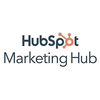



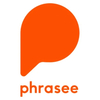


Comments
Your email address will not be published. All fields are required.